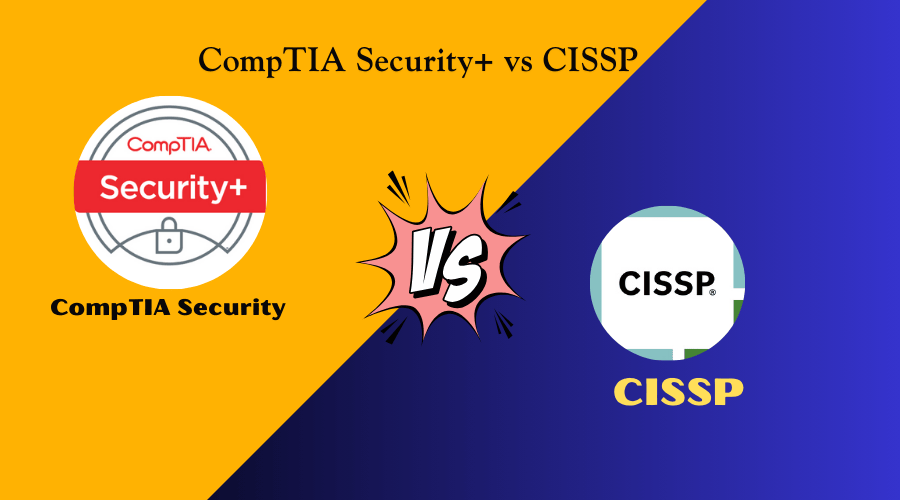Navigating the cybersecurity certification landscape can be challenging for aspiring professionals. Both CompTIA Security+ and CISSP are top-tier certifications in the cybersecurity field, but they cater to different levels of expertise and career goals.
If you’re preparing for the CompTIA Security+ exam, Prepsaret offers Security+ SY0-701 practice tests and other study materials to help you succeed. Let’s dive into a detailed comparison of these certifications, covering salary potential, exam costs, difficulty, and the career paths they unlock.
CompTIA Security+ vs CISSP Salary Comparison
The cybersecurity job market continues to evolve at a rapid pace, with certifications playing an increasingly crucial role in career advancement and earning potential.
Salary differences between various certification levels can be significant. It is essential for professionals to understand how CompTIA Security+ and CISSP impact their financial prospects. These certifications also play a crucial role in overall career growth in the dynamic world of information security certification.
When it comes to the CompTIA Security+ vs CISSP salary landscape, the difference is quite significant.
Average Salary for Security+ Professionals
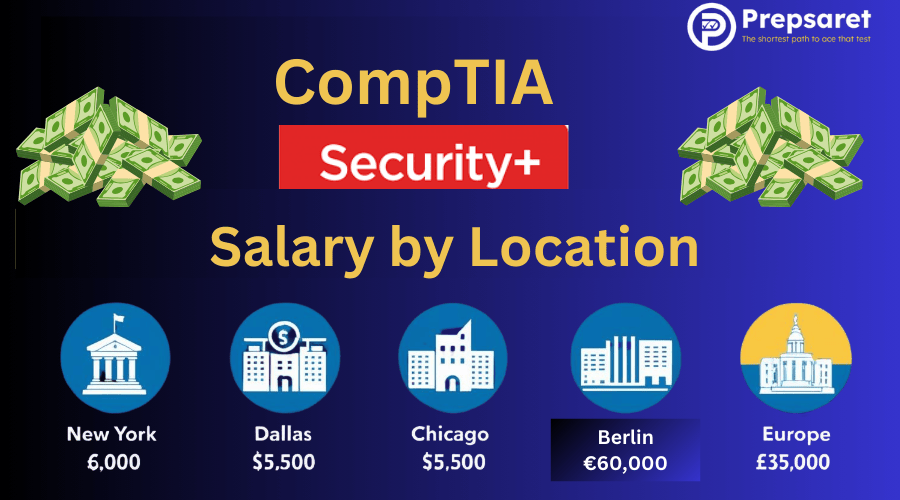
Entry-level cybersecurity professionals with a Security+ certification typically earn between $50,000 and $75,000 annually. This certification serves as an excellent starting point for those beginning their IT security career path, providing a solid foundation in network security fundamentals and ethical hacking basics.
Many organizations view Security+ as a critical credential for entry-level positions in IT support, network administration, and junior security roles.
Related post: CompTIA Security+ salary
Average Salary for CISSP Professionals
CISSP certification dramatically increases earning potential, with professionals typically commanding salaries between $90,000 and $150,000. The CISSP vs Security+ salary comparison clearly demonstrates the substantial financial impact of advanced certification in the cybersecurity job market.
Experienced CISSP-certified professionals often find themselves in high-demand leadership positions, including security architects, chief information security officers (CISOs), and senior security consultants.
The CISSP vs Security+ salary comparison clearly demonstrates the value of advanced certifications in the cybersecurity job market. Experience plays a crucial role in salary potential. While Security+ certification provides an excellent entry point, CISSP certification opens doors to senior and leadership positions, dramatically increasing earning potential in the IT security career path.
CompTIA Security+ vs CISSP Costs
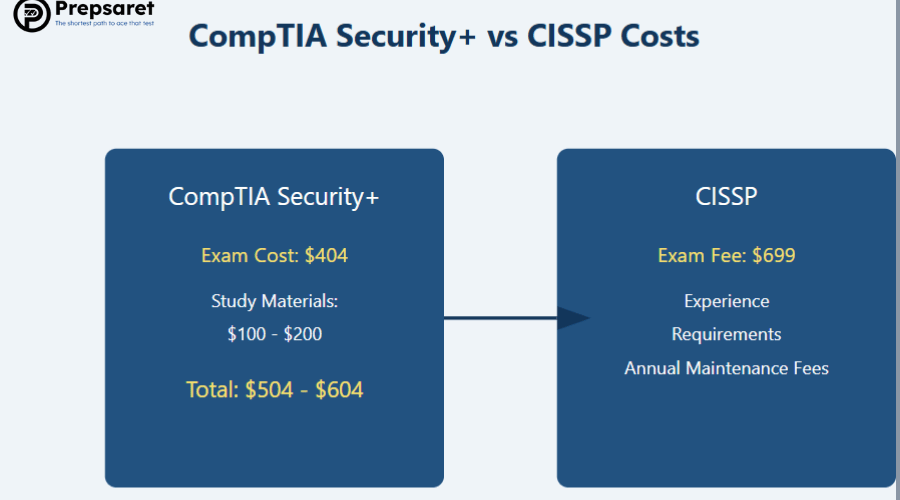
Understanding the financial investment required for cybersecurity certifications is crucial for professionals planning their career development. The costs associated with obtaining these credentials can vary significantly and impact career decision-making.
- Cost of CompTIA Security+ Exam: The CompTIA Security+ exam cost is relatively affordable. The current CompTIA Security+ certification exam cost is $404. This makes it an attractive option for those just starting their cybersecurity journey. Additional study materials might add another $100 to $200 to the total investment.
- Cost of CISSP Certification: CISSP certification, on the other hand, involves a more substantial financial commitment. The exam fee is around $699, and candidates must also meet experience requirements and pay annual maintenance fees. The CISSP certification process is more complex and expensive, reflecting its advanced nature.
When comparing CompTIA Security+ vs CISSP costs, consider the long-term return on investment. While CISSP requires a higher upfront investment, it typically leads to significantly higher-paying positions in the cybersecurity job market.
CISSP vs Security+ Difficulty
How difficult is the CISSP exam compared to Security+? Certification difficulty is a critical consideration for cybersecurity professionals at different stages of their career. Understanding the challenges associated with each certification can help individuals make informed decisions about their professional development.
CompTIA Security+ Difficulty Level
The CompTIA Security+ exam is designed as an entry-level certification, making it more accessible to beginners. It covers fundamental network security fundamentals and introduces basic concepts of ethical hacking and penetration testing. Most candidates with some IT background can prepare for this exam within 2-3 months of dedicated study.
CISSP Exam Difficulty
CISSP presents a significantly more complex challenge, requiring extensive experience and in-depth knowledge of the risk management framework. The CISSP exam presents a much more challenging landscape. It requires:
- Minimum of five years of cumulative paid work experience in two or more of the eight domains
- Deep understanding of advanced information security concepts
- Comprehensive knowledge of risk management framework
- Ability to think strategically about complex security challenges
Many professionals consider the CISSP exam significantly more difficult, requiring extensive preparation and real-world experience.
Best Certification for Cybersecurity Professionals
Selecting the right certification can be a transformative decision for cybersecurity professionals. Each certification offers unique advantages tailored to different career stages and expertise levels.
CompTIA Security+ stands out as the perfect entry point for newcomers to the cybersecurity landscape. This certification provides a robust foundation by offering:
- Comprehensive introductory cybersecurity knowledge
- Industry-recognized credentials for beginners
- An exam structure designed for accessibility
- Broad coverage of fundamental security principles
The certification equips aspiring professionals with essential skills and demonstrates their commitment to understanding core security concepts.
In contrast, the CISSP certification targets seasoned cybersecurity experts. It’s strategically designed for professionals who have:
- Substantial experience in security roles
- Aspirations for leadership positions
- Deep technical understanding of complex security environments
- Proven track record in advanced IT security domains
CISSP represents the pinnacle of professional certification, challenging candidates with comprehensive, advanced security knowledge. It’s ideal for those looking to elevate their career from technical roles to strategic security leadership positions.
Related post: Best Cybersecurity Certification
Should I Get CISSP or Security+ First?
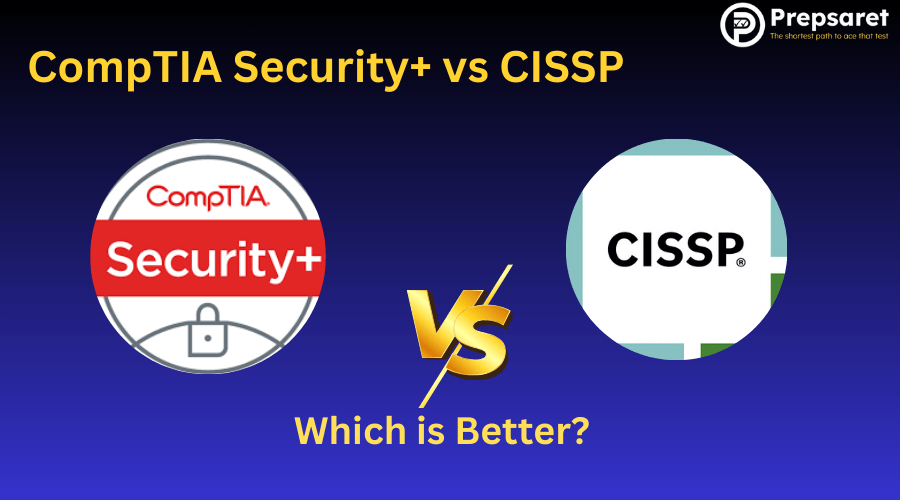
Career progression in cybersecurity requires strategic certification planning. Knowing when to pursue each certification can significantly impact professional growth. The path to professional excellence is clear: start with CompTIA Security+ and systematically progress towards CISSP as your career evolves.
CompTIA Security+ serves as the critical entry point for aspiring cybersecurity professionals. This certification establishes fundamental network security fundamentals and provides a solid foundation in ethical hacking and penetration testing. For beginners, Security+ offers several key advantages:
- Validates basic cybersecurity knowledge
- Demonstrates commitment to the IT security career path
- Meets many employer baseline certification requirements
- Builds confidence for more advanced certifications
As you gain practical experience, CISSP becomes the ultimate goal. Typically, professionals should:
- Obtain Security+ in the first 1-2 years of their career
- Accumulate at least 3-5 years of hands-on cybersecurity experience
- Develop expertise across multiple security domains
- Prepare for the more rigorous CISSP examination
The progression from Security+ to CISSP is a strategic journey of continuous learning. Security+ opens doors, while CISSP represents the pinnacle of professional achievement in information security certification.
Each certification builds upon the last, creating a robust professional development pathway that demonstrates growing expertise and commitment to the cybersecurity field.
Related post: Is CompTIA Network+ Worth It for Beginners?
Which Cybersecurity Certification Has More Job Opportunities?
The cybersecurity job market offers diverse opportunities for professionals with different certification levels. CompTIA Security+ and CISSP open distinct career pathways, each catering to unique stages of professional development in the IT security landscape.
The cybersecurity job market continues to expand, with both Security+ and CISSP certifications in high demand. Security+ serves as an excellent entry point, while CISSP remains the gold standard for experienced professionals
Job Opportunities for Security+ Holders
Security+ serves as a gateway to the cybersecurity profession, unlocking opportunities for professionals at the beginning of their career path. Typical CompTIA Security roles include:
- Entry-level IT support specialist
- Junior security analyst
- Network administration assistant
- Help desk technician
- IT security technician
These positions provide critical foundational experience, allowing professionals to build practical skills and understand network security fundamentals. Security+ certification demonstrates baseline competency and commitment to the cybersecurity field.
Job Opportunities for CISSP Holders
For experienced professionals, CISSP represents a significant career advancement, opening doors to high-level strategic positions:
- Security architect
- Chief Information Security Officer (CISO)
- Enterprise security manager
- Senior risk management consultant
- Information security leadership roles
CISSP-certified professionals are viewed as strategic thinkers who can design comprehensive security frameworks and lead complex cybersecurity initiatives.
While Security+ offers more entry-level opportunities, CISSP provides greater depth and higher-paying leadership positions. The key is strategic progression: start with Security+ and systematically advance towards CISSP as your expertise grows.
Information Security Certification: CompTIA Security+ vs CISSP
In the dynamic landscape of information security certification, CompTIA Security+ and CISSP represent two critical milestones in an IT security career path. These certifications provide distinct approaches to understanding and implementing comprehensive security strategies.
Security+ covers basic information security principles, introducing professionals to key concepts. CISSP delves much deeper, providing comprehensive knowledge for advanced information security leadership roles.
Security+ for Information Security Roles
CompTIA Security+ serves as an essential foundation for professionals entering information security roles. This certification covers fundamental skills critical for entry-level positions, including:
- Basic network security fundamentals
- Threat detection and management
- Cryptography essentials
- Incident response protocols
- Ethical hacking introductory concepts
Security+ prepares professionals to understand core security principles, making it an ideal starting point for those seeking to establish credibility in cybersecurity job markets. It validates baseline knowledge required for junior security analyst certification positions and IT support roles.
CISSP for Advanced Information Security Roles
CISSP represents the pinnacle of information security leadership certification. Designed for experienced professionals, this credential demonstrates advanced expertise in comprehensive security strategy and risk management framework.
CISSP-certified professionals are equipped to:
- Design enterprise-wide security architectures
- Lead chief information security officer (CISO) initiatives
- Develop strategic risk mitigation strategies
- Implement advanced security governance models
- Navigate complex cybersecurity challenges
Risk Management Framework in Security+ vs CISSP
Risk management forms the backbone of effective cybersecurity strategies, with Security+ and CISSP offering distinct approaches tailored to different professional levels.
Security+ Risk Management Overview
For entry-level professionals, Security+ introduces foundational risk management concepts. The certification covers:
- Basic risk identification techniques
- Simple threat assessment methodologies
- Fundamental risk mitigation strategies
- Initial incident response planning
These skills provide newcomers with a structured approach to understanding organizational security risks, preparing them for initial IT security career roles.
CISSP Risk Management Expertise
CISSP elevates risk management to a strategic leadership level. Certified professionals develop sophisticated capabilities:
- Comprehensive enterprise risk assessment
- Advanced threat modeling
- Complex security architecture design
- Strategic risk mitigation planning
- Organizational security governance frameworks
Security+ provides a foundational understanding of risk management, while CISSP offers an advanced, strategic approach to managing organizational security risks.
Ethical Hacking and Penetration Testing
Security+ introduces basic concepts of ethical hacking, providing a foundation for understanding network security fundamentals. CISSP goes further, covering advanced penetration testing techniques and strategic security approaches.
Security+ and Ethical Hacking
Security+ introduces fundamental ethical hacking concepts, covering:
- Basic penetration testing principles
- Network vulnerability identification
- Initial threat detection techniques
- Foundational cybersecurity defense strategies
CISSP and Ethical Hacking
CISSP provides advanced penetration testing expertise, including:
- Complex vulnerability assessment
- Strategic security architecture design
- Advanced persistent threat analysis
- Comprehensive defensive strategy development
CISSP vs CISM vs Security+
While CISSP focuses on broad security management, CISM specializes in information security management. Security+ remains the best starting point for those new to the field.
CISSP stands out as a comprehensive security management certification, offering broad coverage of information security domains. It’s designed for professionals seeking a holistic understanding of security strategies and enterprise-wide security principles.
CISM (Certified Information Security Manager) takes a more specialized approach, focusing specifically on information security management. This certification is tailored for professionals who want to excel in managing, designing, and overseeing an enterprise’s information security program.
Security+ serves as the foundational entry point for those beginning their cybersecurity journey. It provides essential skills and knowledge for entry-level IT security roles, covering fundamental network security and basic security concepts.
Key differences emerge in their target audiences:
- Security+: Ideal for beginners and those starting in IT security
- CISM: Best for experienced professionals in information security management
- CISSP: Suited for senior security professionals seeking broad, strategic security expertise
Each certification represents a unique step in the cybersecurity career progression, catering to different levels of expertise and professional goals.
CompTIA CASP+ vs CISSP
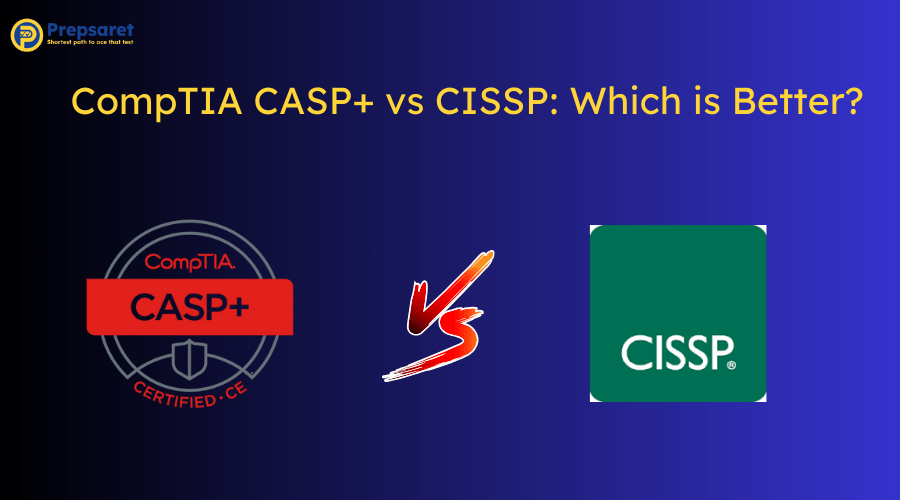
CompTIA CASP+ Overview
The CompTIA Advanced Security Practitioner (CASP+) certification represents a specialized pathway for technical security professionals seeking to demonstrate advanced cybersecurity competencies.
Unlike broader certifications, CASP+ zeroes in on hands-on technical skills, making it an attractive option for professionals who want to dive deep into practical security implementation.
Key characteristics of CASP+ include:
- Strong emphasis on technical security implementation
- Focus on enterprise security architecture
- Practical approach to cybersecurity challenges
- Detailed technical knowledge requirements
CISSP Comparison
The Certified Information Systems Security Professional (CISSP) certification takes a more comprehensive, strategic approach. While CASP+ delves into technical execution, CISSP provides a panoramic view of information security management, covering broader organizational security strategies.
Which is Better for Advanced Security Roles?
Choosing between CASP+ and CISSP depends entirely on your career trajectory:
CASP+ is ideal for:
- Technical security engineers
- Security architects focused on implementation
- Professionals who prefer hands-on technical work
- Those seeking deep technical security expertise
CISSP is perfect for:
- Security managers and directors
- Professionals pursuing leadership roles
- Those responsible for enterprise-wide security strategy
- Individuals interested in comprehensive security governance
Network Security Fundamentals: Security+ vs CISSP
Security+ Network Security
Security+ introduces foundational network security concepts, providing entry-level professionals with essential networking and security fundamentals. It covers:
- Basic network security protocols
- Fundamental threat detection principles
- Entry-level security configuration skills
- Introduction to network defense strategies
CISSP Network Security
CISSP elevates network security understanding to a strategic level. It explores:
- Advanced network architecture design
- Enterprise-level security infrastructure
- Complex threat mitigation strategies
- Comprehensive risk management frameworks
Making Your Choice
Both certifications offer valuable paths in cybersecurity. Your career goals, current expertise, and professional aspirations will ultimately guide your decision. Whether you choose the technical depth of CASP+ or the strategic breadth of CISSP, continuous learning remains key to success.
Related post: CompTIA Security+ Test Prep
Frequently Asked Questions (FAQs)
Should I Get Security+ Before CISSP?
Yes, Security+ provides an excellent foundation. It helps build fundamental skills and knowledge, making it an ideal starting point before pursuing the more advanced CISSP certification.
What is the CompTIA Equivalent of CISSP?
CompTIA CASP+ is the closest equivalent, offering advanced-level security certification. However, CISSP remains more recognized in enterprise and leadership roles.
Is CompTIA Security+ Worth It?
Absolutely! Security+ validates foundational cybersecurity skills, improves job prospects, and serves as a critical stepping stone in the IT security career path.
Is CISSP Worth It?
For experienced professionals, CISSP is highly valuable. It demonstrates advanced expertise and can significantly enhance career opportunities and earning potential.
Is CompTIA Security+ a Hard Exam?
Security+ is challenging but manageable for those with basic IT knowledge. Proper preparation and study can help candidates successfully pass the exam.
Which Cybersecurity Certificate is Best?
The best certification depends on individual career goals. Security+ is great for beginners, while CISSP suits experienced professionals seeking advanced roles.
How Much Can I Make with Just a Security+ Certification?
Security+ certified professionals can expect salaries ranging from $50,000 to $75,000, with potential for growth as they gain experience.
Is Security+ in Demand?
Yes, Security+ remains highly demanded in the cybersecurity job market, particularly for entry-level and mid-level IT security positions.
Start Your CompTIA Security+ or CISSP Certification Journey Today!
Choosing between CompTIA Security+ and CISSP is a strategic decision that can shape your cybersecurity career. Each certification offers unique benefits and opportunities across different stages of professional development.
Assess your current experience, career goals, and professional aspirations to make the best choice for your future in this exciting and dynamic field of information security. Start your preparation today for Security+ exam with Prepsaret’s practice tests! Don’t wait any longer

